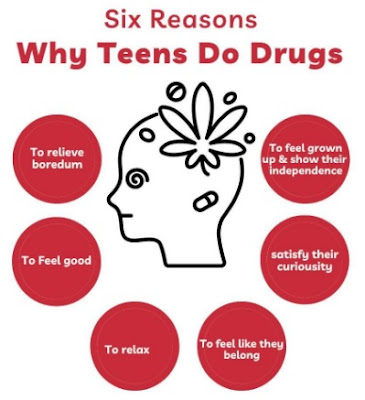The teenage
years often come with insecurities, low self-esteem, and fear of not being
accepted. Adolescents are constantly questioning themselves and their choices.
At this age, peer acceptance becomes increasingly important. They may feel they
have to do what they believe everyone else is doing or risk being left out. So
in order to fit in, look “cool”, or join an older or more popular social circle,
many teens may start buying and using drugs.
Studies such
as the National Survey on Drug Use and Health, reported by the Substance Abuse
and Mental Health Services Administration (SAMHSA), indicate that early (age
12-14) to late (age 15-17) adolescence is a critical risk period for the
initiation of substance use. Substance use may peak among young people aged
18-25 years. This is why experts recommend that parents begin talking with
their children at an early age about the dangers of alcohol and drugs before
they reach the critical risk period - keeping the conversation age-appropriate,
being clear about rules and expectations, ask and listen to them, and most of
all, continue the on-going conversation.
Risk factors
for drug use may include low grades/failure in school, having been a victim of
bullying or cyberbullying, low self-esteem, permissive parenting, parent or
older sibling who may use alcohol or drugs, or living in a community with a high
tolerance for smoking, drinking, or drug use among youth. While it is not always
possible to predict what makes a teen turn to drugs, these are some early
warning indicators parents can watch out for, according to the U.S. Drug Enforcement
Agency (DEA).
The teen
years are a time to explore and learn more about themselves as they approach
adulthood, including experimenting and testing boundaries. The DEA emphasizes
that the desire to do something new or risky is a normal part of teen
development. However, even as they are growing up, teens still value the support
and guidance of their parents, caregivers, and other responsible adults that
play an influential role in their lives – even though it may not always seem
that they do.


No comments:
Post a Comment